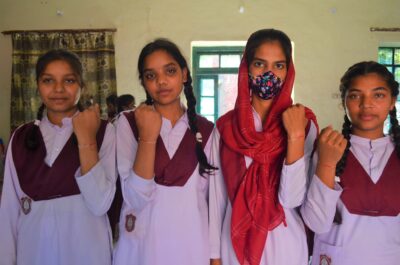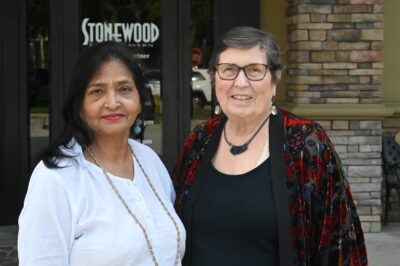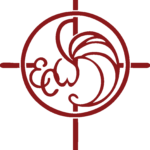By Alice C. Clark
 Pakistan, being a male-dominated society, has always kept women suppressed, both in the workplace and at home. Women are conditioned to keep the family honor as their utmost priority. Suffering for the rest of their lives is considered “obedience” on their part. Speaking up for themselves is considered dishonor to the family.
Pakistan, being a male-dominated society, has always kept women suppressed, both in the workplace and at home. Women are conditioned to keep the family honor as their utmost priority. Suffering for the rest of their lives is considered “obedience” on their part. Speaking up for themselves is considered dishonor to the family.
In such a conservative structure of society, the Diocese of Raiwind Church of Pakistan played its vital role in uplifting and empowering such women through the Women Development Services (WDS), which was founded by Rev. Khushnud Mussarat Azariah (wife of the former Bishop of Raiwind Diocese), in 1989. Starting with a small desk and financially instable,but holding a firm vision to empower the voiceless women, this small organization strengthened its roots. Its members were committed to helping the oppressed daughters of society, especially those belonging to rural and slum areas, because 80 percent of the Diocesan parishes were located in such areas.
The Women’s Desk came under the supervision of Alice R. Garrick in 1990, and formally the mission of Christ commenced for empowering the women. Those living in far-flung villages and slums came under Diocesan jurisdiction, spread over three districts – namely Lahore, Kahna, and Raiwind. Various projects aimed to impart education to women through adult literacy programs and skill trainings and through vocational classes, set up in the areas mentioned above. Women’s Desk also provided health care facilities and developed initiatives for mother and child support programs.
In the late 1990s, some women often paid visits to Bishop Samuel Azariah (then Bishop of Raiwind) and asked the church to help them financially and to give them resources so that they might look after their children to give them a future. These women were involved in home-based prostitution and had no other dignified means to meet the needs of their household, as mostly their husbands were drug addicts (unskilled and unemployed). Even if they worked in factories or as housemaids, these women were vulnerable to predators to be exploited sexually.
Bishop Samuel Azariah shared this pain with Alice Garrick (then coordinator and current executive director of the Women’s Desk), and they started visiting these women. At first, the clergy of the Diocese of Raiwind showed resistance and did not support this initiative, as they believed these people were sinners and were not allowed to be among other people of the congregation in church. These statements were typically influenced by the Eastern culture of the Sub-Continent. Alice Garrick, being supported by the bishop and keeping the fair attitude of Jesus as stated in John 8:7 – “He that is without sin among you, let him first cast a stone at her” – did not give up. She gathered these women to give them skill training, enabling the women to support their families in an honorable way.
HIV/AIDS Awareness and Rehabilitation of Female Sex Workers (FSWs)
A project entitled HIV/AIDS Awareness and Rehabilitation of Female Sex Workers (FSWs) was initiated in 2004 to bring the oppressed women toward light. In relation to this project, a Rehabilitation Center was established in the vicinity of a Christian-dominated town in Lahore, Pakistan. This area was selected for the establishment of the Rehab Center, because the majority of women coming to the bishop for help hailed from this area. Secondly, this town was surrounded by a number of factories/industries, where men from various cities around Lahore or all over Pakistan were employed. Since the men were away from their families and possessed money, these women were a soft target for them. The women were illiterate and unskilled and desperate for money, no matter if it came immorally! Because of these unsafe practices, many of the female sex workers were infected with HIV/AIDS as well as other sexually transmitted diseases (STDs). Hence, this project aimed at providing alternate means of earning for women and also became a source of providing medical facilities and raising health awareness, especially for STDs such as HIV/AIDS.
Later, in 2005, WDS helped these women by enrolling their daughters at the Rehabilitation Center, together with other girls from the same locality (regardless of their religion) who were not able to study further, due to poverty or scoring low marks for admission to college/university, in a midwifery training course (18 months). The vision was to bring change in the society and transform the lives of the daughters of these women, so that they would not continue the same way of life that their mothers had been forced into (and were dying each day in agony). Instead, the goal was that they start their life with dignity in a white uniform and were called “Sister.”
In 2006, a batch of five girls passed the training course and started their practice at the Lady Willingdon Hospital (first teaching hospital associated with WDS). In 2011, WDS became affiliated with another teaching hospital named Zia Hospital & Maternity Complex, followed in 2018 with Al-Shafi Hospital, in 2019 with Lahore Care Hospital, and in 2021 with Health City Hospital. These are now the four teaching hospitals associated with WDS, where the midwife trainees on completion of their one-year training course are enrolled to practice for six months, before being certified. Another Community Health Care project was started by WDS on Multan Road, Lahore, which functioned on similar framework as a Rehabilitation Center, but it later was closed because of lack of funding.
Over the past 18 years, 5,595 females have been provided with midwife training and 95 percent of them are working in various hospitals and clinics, as well as attending private patients. WDS believes the smooth framework of society is formulated when both men and women go hand in hand to work for its betterment. With this “gender-balance” approach, it has carried out training initiatives for men also, and since 2019 the Rehabilitation Center has provided clinical assistant (CA) training. Currently four young men are enrolled, and four graduated in 2021. The duration and process of CA training is similar to that of midwifery training.
Education Support Program
WDS believes that illiteracy gives birth to poverty and poverty is the mother of all evils. In this regard, WDS has initiated many programs for imparting education facilities to the community, including adult literacy programs and schools for street children in the project Child Support Program. At present, WDS is running the Education Support Program. The total literacy rate for females in Pakistan at present is 46.5 percent for females over the age of 15. This program aims to “empower school children, mainly girls to continue their studies, who due to financial constraints are not able to study further.” WDS provides them with uniforms and bears their academic expenses, including the provision of stationery and books/notebooks. So far, 17,000 children, both girls and boys, have benefited from this project.
The main point associated with providing educational support, especially to girls, is that they become able enough to stand firmly as they enter into the next phase of their lives – to become financially independent and work side by side with the men. The Education Support Program breaks patriarchal norms that generalize rather “gender-lize” women to merely do household chores. In the near future, WDS wants to bring young dropout girls, primarily living in villages in Diocesan jurisdiction and working at brick kilns or as vegetable pickers, to come and live in the boarding facility provided by Diocese of Raiwind on its main campus in Lahore. These girls will be enrolled in a Diocesan school adjacent to the boarding facility and will complete their schooling. The biggest challenge that lies ahead is lack of resources, which limits us to take such steps, and because of this, the work suffers at times.
Community Health Care Project
Furthermore, WDS is keenly contributing toward female health issues and regularly organizes medical camps (once a month) in rural or slum parishes of the Diocese of Raiwind. WDS provides medical facilities, such as free medicines and health awareness, as part of another project named Community Health Care Project. Medical camps and health awareness sessions are for both men and women. Relevant printed literature about different diseases is also distributed, along with medical advice to the patients. A daily clinic is running at the Rehabilitation Center of WDS, where the local community benefits from the provision of different health facilities, including antenatal care and blood sugar tests. Previously, immunization initiatives were also taken at Baath Health Center, Multan Road. According to an estimate, in the last decade WDS has helped 7,028 people through health awareness sessions, 3,989 people through medical camps, 230 through immunization, and 10,204 through medical assistance or daily camps. WDS plans to start another health center in the vicinity of a village or slum, where the community can get all medical facilities at their doorstep.
Earning Hands Project
WDS aims to make the women self-supportive and financially independent. For this purpose, the Earning Hands Project of WDS plays an important part in the lives of many unskilled, low-skilled, and illiterate women. Such women become victims of abuse because their voices are suppressed. Previously, Women’s Desk engaged young girls and women in Vocational Centers, set up in villages and slums. Women were fully trained and subsequently set up their own Vocational Centers. Some started tailoring and earned good income for their households. At present, WDS has no Vocational Center because of lack of funds and equipment. However, some skilled groups of women are working and selling their products through WDS.
Along with this, WDS is running a Stitching Unit, where classes such as Custom Tailoring, Clergy Garment Stitching, Communion Table Set Designing & Stitching, and Product Designing are given. Women’s Desk aims to expand this project, but economic disparities hinder the progress. This project also helps the Women’s Desk generate local funding, used in implementing small community projects and even for managing daily office expenses.
Community Capacity Building
The Women’s Desk strongly believes that both men and women should be given space to express themselves and a platform that will enhance their knowledge on various topics, related to environment and society. For this purpose, the Community Capacity Building project has been functioning at the Women’s Desk with enthusiasm and passion. Various training workshops, seminars, and open discussions are held under this project. Significant days set by the United Nations are observed in solidarity, as we contribute to changing the scenario of this world. These days include the International Women’s Day, World AIDS Day, etc. Months include Breast Cancer Awareness Month, Domestic Abuse Awareness Month, etc. Also observed are other important social issues such as human trafficking, child abuse, etc., along with 16 days of Activism Against Gender-Based Violence. These programs aim to explore what society thinks about certain aspects and are also given advanced learning opportunities to make them aware about their surroundings. In the past decade or so, 6,806 people have benefited from these programs.
Food Assistance Program
WDS holds a soft spot for our brothers and sisters in village parishes of our Diocese. Every year, WDS arranges food packets and warm clothes as the winter sets in and distributes these packs of love and warmth to different churches during the Advent season. These packs are specifically given to families who are economically deprived, especially young widows, orphans, daily wagers/laborers, etc. This gesture of sharing love is appreciated deeply by everyone and is an inspiration. An uncountable number of people have benefited from this initiative since it began in 2010. WDS wants to extend this and reach out to a greater number of people because every year a challenge of limited resources is faced, which hampers us from doing more. On average, every year 10-15 churches are visited, where 10-15 families are given food packets and the rest of the congregation are given warm clothing.
Conclusion:
 Women’s Desk at Diocese of Raiwind is transforming the lives of people in different capacities, either through skill trainings, health facilities, education, or capacity-building initiatives. We believe that this is the mission for which Jesus Christ has called us for. He wants us to “Love our Neighbors.” Let’s obey His commands and serve His people tirelessly because He rewards us endlessly.
Women’s Desk at Diocese of Raiwind is transforming the lives of people in different capacities, either through skill trainings, health facilities, education, or capacity-building initiatives. We believe that this is the mission for which Jesus Christ has called us for. He wants us to “Love our Neighbors.” Let’s obey His commands and serve His people tirelessly because He rewards us endlessly.
Inflation has made it even more challenging for Women’s Desk to extend its projects. If God lays on your heart and you want to help in contributing toward any of its six projects, it would be a great step toward the better good of Jesus’s people for whom we are working in the Diocese and even beyond.
The following items are accepted:
- Warm clothing
- Food items
- Sewing machines
- Sewing hits (wool, fabric, threads, beads, etc.)
- Educational expenses of one individual
- Money donations
Contact: Alice R. Garrick
http://facebook.com/wdsdioceseofraiwind1989
Women Development Services
Diocese of Raiwind Church of Pakistan,
17 Warris Road, Lahore
Pakistan 54000

